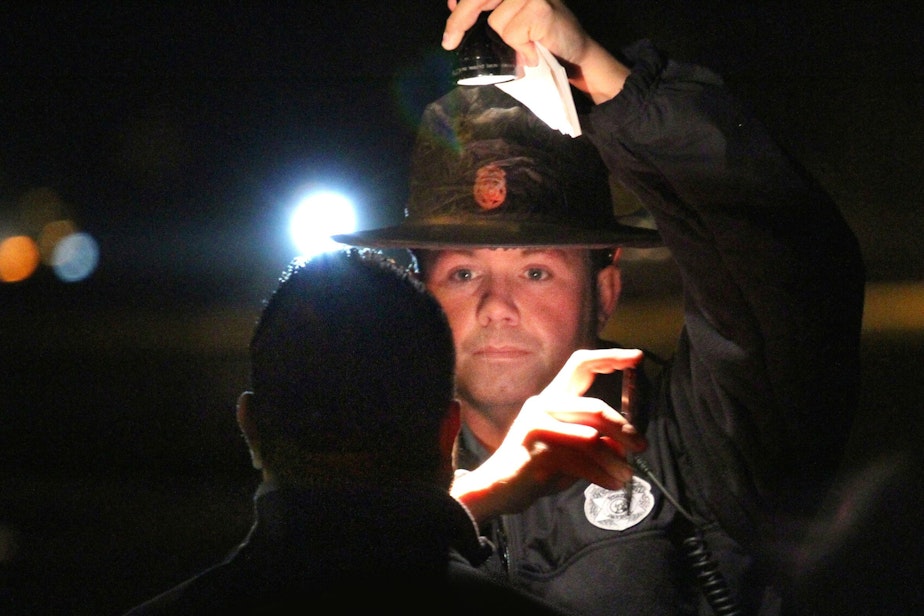WA lawmakers push stricter .05 DUI limit amid record road deaths

There's a renewed push in the Washington state Legislature to lower the blood alcohol limit to .05, a significant decrease from the current standard of .08. If the bill passes, Washington would join Utah as one of only two states in the nation with stricter standards. State Sen. Marko Liias, a Democrat from Mukilteo, is one of the bill’s sponsors. KUOW’s Kim Malcolm asked him why he supports it.
This interview has been edited for clarity.
Marko Liias: Unfortunately, we are facing an epidemic of traffic safety challenges in Washington state. We are seeing the highest levels of traffic fatalities in decades. The latest data shows us that over 700 people died on our transportation system statewide in 2022, and that is missing the last two weeks of data. We think the number will go up, unfortunately. If you go back just a few years, we were in the four hundreds in terms of fatalities. Still a high number, but it has risen significantly.
We're trying to look for everything we can do to reduce those fatal collisions, as well as serious injuries. Addressing driving while under the influence is one important way to do that, and the data from Utah is really strong. We want to make sure that we get those same results here in terms of saving lives and helping people be safe on our transportation systems.
Kim Malcolm: Tell us about the evidence that suggests dropping the blood alcohol limit will cut down on the number of people dying in collisions.
The first thing is the scientific evidence about the impact of alcohol on the human body. When your blood alcohol content reaches .05, medical experts tell us that your reaction times and your ability to make critical decisions is about 40% worse than when you have a blood alcohol content of zero. When you are at .08, it's something like 160% worse.
Sponsored
The National Transportation Safety Board, as well as other federal agencies, have studied the implementation in Utah, and they've identified a 20% reduction in fatal crashes in that state as a result of this law. In Washington, when we've got 700 people lost, 20% would be 140 people in our state still coming home at the end of the night, people at the Christmas table, at birthdays, at weddings, that aren't there today, because of a preventable condition like this.
If this passes, are you concerned that people will still drink what they consider to be a reasonable amount, and yet still be subject to arrest?
I think that's where we're going to need a strong public education campaign. The example you gave is a good one. If you're at dinner for two or three or four hours with some friends and you have one glass of wine, our body can metabolize that drink. So, we need to think about those factors. And everybody's body reacts a little bit differently, but we do want people to have that thought process and say, "Alright, how much have I had to drink? How long has it been?"
And when we're in doubt, use an alternative. Have someone who didn't have a drink drive you home, call a ride-share, if you're close enough, walk or take the bus. That's what we want, that conversation. Ultimately, we don't want law enforcement to have to be engaged in this process. That means we failed to make the behavior change we want to get to. We really want folks to just give it another thought.
Alcohol sales are a mainstay for many bars and restaurants. I'm wondering what your message is to them, and if you're hearing any concerns that this limit may be too strict.
Sponsored
When we looked at the data in Utah when they implemented this law it didn't have a negative impact on sales for hospitality establishments, or on the sale of alcohol in that state. Now, some people tell me in Utah, a more Mormon community, they don't drink as much as we do. So, apples to apples, we'll see. But we know that even in a state where they maybe drink less than we do, the sales still went up in the years after this law was introduced. That's my message.
I've got some brilliant craft distillers in my community. I've got craft brewers that are at the heart of economic development in small towns. We've got the amazing Washington wine community in our state. I don't want them to be impacted negatively at all. I want to make sure that our in-state industries are strong and continue to provide jobs and opportunities in our communities. I just don't want people driving.
Listen to the interview by clicking the play button above.





